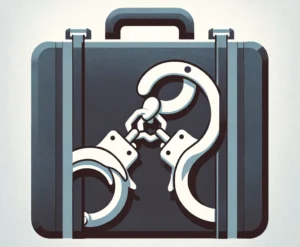The moment you realize that long-forgotten speeding ticket has snowballed into a bench warrant, job hunting goes from hard to “do I need a lawyer now?”. Your stomach churns thinking about background checks, but exactly how deep does this rabbit hole go?
In this post, you’ll find straightforward guidance to navigate the murky waters of job searching with a bench warrant hanging over your head.
Quick Takeaways:
- Bench warrants appear on background checks and can affect job prospects; promptly checking your status with local courts or online databases is crucial.
- Resolve a bench warrant by seeking legal advice, turning yourself in, and satisfying court requirements to avoid complications with employment.
- Consider disclosing your warrant responsibly during the job hunt and explore remote or freelance work as alternatives while resolving your legal situation.
What’s a Bench Warrant and Why Does it Matter for Employment?
A bench warrant is a court order issued by a judge, often when someone fails to appear in court or comply with a court ruling. It differs from arrest warrants, which are typically issued for criminal matters when there’s probable cause to believe someone has committed a crime. Bench warrants are more like the court’s way of waving you back in and saying, “Hey, you missed something important here.”
For employers, a bench warrant might raise a red flag. It could indicate potential unreliability or suggest that an applicant hasn’t resolved legal issues that could interfere with their job performance. It’s all about risk management. Employers tend to steer clear of risks, and a bench warrant might spell “risk” to a hiring manager.
Will a Bench Warrant Show Up on a Background Check?
Employers go through different types of background checks, including criminal history, credit reports, and past employment verifications. The depth of these checks can vary widely.
Yes, bench warrants can show up on background checks. If an employer performs a comprehensive criminal background check, it’s likely they’ll see any outstanding warrants, bench included. And because warrants are matters of public record, they’re easy to find if someone is looking.
How Do I Know If I Have a Bench Warrant?
If you’re breaking out in a sweat over this, don’t worry. There are a few steps to figure out if you’ve got a bench warrant out for you:
- Check with Your Local Court: Give them a ring, or if they’re just around the corner, pay them a visit. Court clerks should be able to tell you if there’s a bench warrant in your name.
- Use Online Databases: Many regions have online systems where you can search for warrants. It’s not a wild goose chase; it’s a direct way to put your mind at ease (or to take action, if needed).
Remember, being upfront with a potential employer about any issues that might come up during a background check can be to your benefit. Transparency builds trust!
Now, don’t let the information trail go cold—there’s more to learn in this post. Keep reading to understand what to do next if you do have a bench warrant, and how you might still land that job you’re eyeing.
Can I Apply for Jobs with a Bench Warrant?
When you’re out there pounding the pavement, looking for a new job with a bench warrant hanging over your head, it’s like walking a tightrope. On the one hand, you’ve got the drive to move forward in your career; on the other, there’s the weight of the legal system pulling at your sleeve.
Legal and Ethical Considerations
Legally speaking, you can apply for jobs even if there’s a bench warrant in your name. However, if your potential employer conducts a background check, which is common practice, the warrant is likely to pop up. This could raise red flags about your reliability and honesty. Ethically, it’s a conundrum. Transparency fosters trust, but divulging your warrant might put the kibosh on your chances from the get-go.
To Disclose or Not to Disclose
Whether to disclose the warrant during the job application process is a dicey topic. It generally depends on the job and industry. Some recommend waiting until a conditional offer is made to reveal such personal legal matters. You could argue that being upfront about it is a bold move that shows integrity. Yet, let’s face it: the job market isn’t always forgiving. Here’s a nugget of advice that’s not widely shared: craft a narrative. If you decide to disclose, tell your story in a way that highlights your responsibility and steps taken towards resolution.
What Should I Do If There’s a Warrant Out for Me?
Ignoring a bench warrant is like ignoring a ticking time bomb; it could explode at the most inconvenient time. Say you’re on your way to a dream job interview and—bam!—you get picked up for that outstanding warrant. There goes your big opportunity, not to mention your freedom, down the drain. So, what’s the game plan?
Steps to Resolve a Bench Warrant:
- Get Legal Advice: Talk to an attorney to understand your situation and the best course of action.
- Turn Yourself In: It sounds daunting, but sometimes showing up at the courthouse can lead to a quicker resolution.
- Clear the Air: Arrange to pay any fines or comply with court orders; sometimes that’s all it takes to lift the warrant.
- Stay Informed: Keep tabs on the status of your case post-resolution to ensure the warrant is indeed cleared from your record.
Addressing the Warrant:
Facing the music is key. A warrant won’t just go away if you ignore it, and the situation can worsen over time, turning a bad tune into a cacophony of legal troubles. Taking steps to clear your name shows that you’re proactive and responsible—qualities that employers love.
Is It Possible to Work Remotely or Freelance with a Bench Warrant?
Nowadays, with remote work and gig economies booming, you’ve got more options than ever. If a background check feels like a barrier as high as the Great Wall, why not take a gander at the world of freelance or remote work?
Exploring Non-Traditional Employment:
- Freelance work can be a boon for folks with legal worries. Sites like Upwork or Fiverr rarely require a background check.
- Remote positions may still require a background check, but there are industries, like tech or creative content creation, where your skills and portfolio speak louder than your past.
Pros and Cons:
Pros:
- Flexibility: You set your own hours and choose your projects.
- Anonymity: Freelance clients typically focus on the work output, not the worker’s background.
- Opportunity: You can build a robust portfolio and reputation based on the quality of your work.
Cons:
- Uncertainty: Freelance work can be sporadic and unreliable income-wise.
- No Benefits: You’ll be missing out on benefits that come with traditional employment, like healthcare or retirement plans.
- Legal Risks: The warrant is still out there. If you need to sign a contract or end up working with a client who runs background checks, you may hit a snag.
In the end, you want to be sure the job you’re chasing won’t end up chasing you back. A freelancer with a bench warrant needs to be particularly prudent—keeping a low profile and resolving legal woes to avoid complications down the line.
Remember, honesty is the best policy, but timing and context are everything. Chart a path that aligns with your career goals, legal responsibilities, and personal ethics. And above all, don’t let that bench warrant catch you sitting down—get proactive and clear it.






